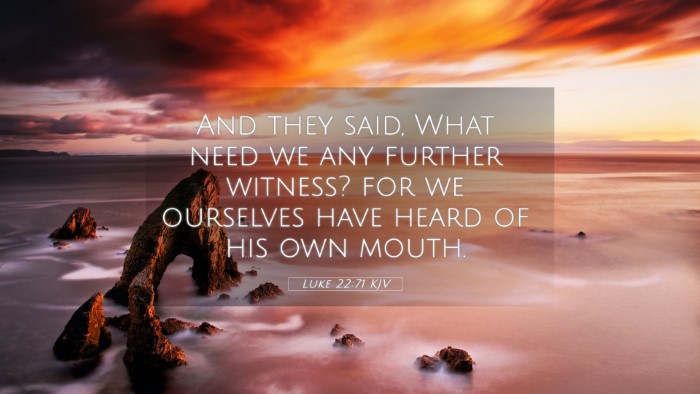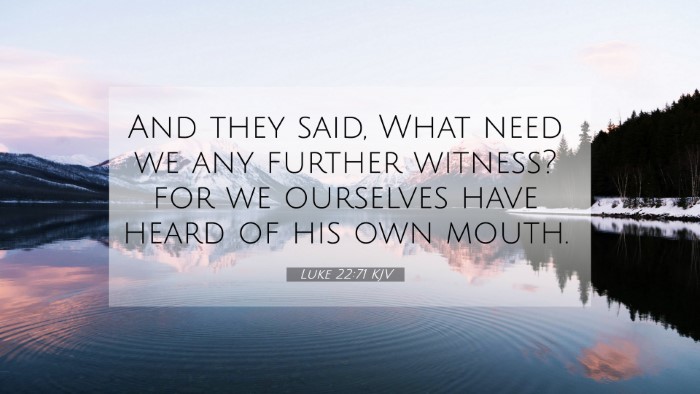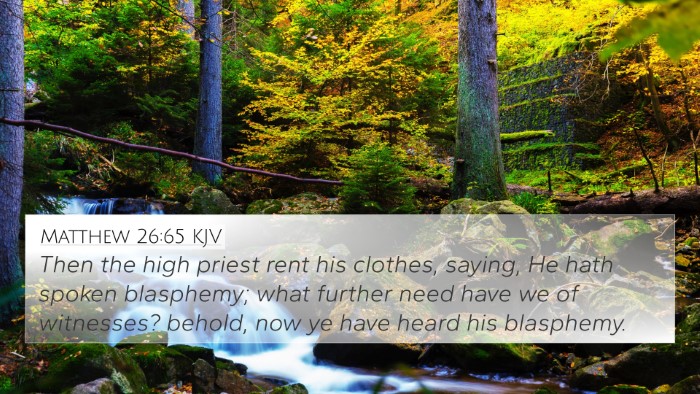Understanding Luke 22:71
Luke 22:71 states: "And they said, What further need have we of witness? for we ourselves have heard of his own mouth." This verse takes place during the trial of Jesus, where the religious leaders are questioning Him before His crucifixion. This passage indicates a critical moment in the Passion narrative of the Gospels, emphasizing themes of witness, truth, and the fulfillment of prophecy.
Commentary Insights
From a composite understanding of various public domain commentaries, such as those by Matthew Henry, Albert Barnes, and Adam Clarke, we can derive several key meanings and themes present in this verse:
- The Finality of Condemnation: The religious authorities recognize that they have all the evidence they need, as they have heard Jesus affirm His identity as the Son of God. This reflects the theme of human accountability before divine truth.
- Truth as Testimony: The phrase "we have heard" signifies that testimony is more than just hearsay; it points toward a revelation that demands a response. The authorities are not just passively receiving information; they are actively rejecting it.
- Fulfillment of Prophecy: This verse reflects the culmination of Old Testament prophecy regarding the Messiah, connecting to scriptures that foreshadow these events, emphasizing the divine orchestration of Jesus’ destiny.
- Irony of Knowledge: Here, the irony is palpable: the leaders, who should be leading others to the truth, are instead walking in blindness. This theme is recurrent throughout the Gospels where spiritual leaders fail to recognize God’s work.
- Importance of Witness: The term “witness” is significant in biblical law; it underscores the requirement of having established testimony. Their claim highlights the importance and weight of their judgment against Jesus.
Cross-References and Thematic Connections
Luke 22:71 is rich with connections to other biblical texts, reinforcing the narrative and theological themes within the Christian tradition. Here are some key cross-references:
- Mark 14:63-64: Similar judicial proceedings where Jesus is questioned about His identity and claims.
- Matthew 26:65-66: The high priest's actions in response to Jesus’ declarations.
- John 18:37: Jesus affirms that He came to bear witness to the truth, establishing His role as a true witness.
- Isaiah 53:7: A prophecy regarding the suffering servant who is silent before His accusers.
- Psalms 39:9: A reflection on the theme of silence in the face of injustice, paralleling Jesus’ demeanor during His trial.
- Acts 4:18-20: Early apostles’ testimony in light of opposition, echoing the rejection faced by Jesus.
- 1 John 5:10: The significance of belief and testimony regarding the Son of God, connecting to the theme of verification of truth.
Thematic Bible Verse Connections
Exploring the connections between Luke 22:71 and other verses illuminates broader theological discussions:
1. Human Accountability
The narrative speaks to the inherent accountability that comes with knowledge—shouldering the weight of truth reveals responsibility towards God’s revelation.
2. The Nature of Truth
This moment emphasizes the biblical portrayal of truth as actionable, not merely theoretical.
3. Fulfillment of Prophecy
The events taking place align with prophecies, suggesting that history is unfolding as divinely ordained.
4. Witness and Testimony
In both Old and New Testaments, the concepts of witnesses and testimony are integral to the faith narrative, echoing the importance of credible testimony in establishing truth.
5. Irony and Suffering
This passage highlights the irony of those who should understand failing to grasp the significance of the moment, which is a recurring element in the narrative of Jesus’ suffering.
Tools for Bible Cross-Referencing
To explore Bible verses that relate to each other thoroughly, consider employing the following tools:
- Bible Concordance: An invaluable resource that lists occurrences of words and phrases, enabling readers to find related scripture easily.
- Bible Cross-Reference Guide: Guides that provide thematic links between verses, enhancing understanding and application.
- Cross-Reference Bible Study: Methods for conducting deep studies exploring themes and parallels between scriptures, allowing for a richer understanding of biblical texts.
Conclusion
Luke 22:71 serves as a pivotal moment in the Gospels. It encapsulates the rejection of truth amidst overwhelming evidence, reinforcing the themes of witness, accountability, and prophecy. By engaging with various cross-references and utilizing tools for Bible study, one can deepen their understanding of this scripture and its theological implications.




